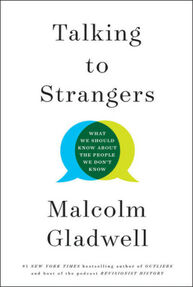Talking to Strangers; Malcolm Gladwell; 2019; Little Brown and Company; 356 pgs, notes, index25/3/2020 As it happens, most of the events upon which this book was based either happened in my recent lifetime, or are matters of well known historical events, such as Chamberlin meeting Hitler. Thus, I do have a perspective on these issues. All in all, this is a hard book to summarize. In part because it is basically clinical psychology, which is a soft science at the best of times.
The book wraps its arguments around several well known cases and/or events. It opens and closes with Sandra Bland, the young black woman who was pulled over in Texas (she drove down from Chicago) for "failing to signal", ended up being manhandled out of the car, cuffed and arrested, and then hung herself in the jail. The first case described in detail was about a high ranking CIA official who turned out to be a Cuban spy. The second was about Chamberlin meeting Hitler. The basic message is that we suck at spotting liars. Ample evidence is provided that shows that a computer evaluating parole issues from raw data scores much better results than a judge who can look the perp in eye and judge their demeanor. This does not surprise me one bit. As a life long poker player, I have determined that I suck at it too, and I would be better off simply following the odds. We rely way to much on our ability to tell when we are being lied to. And once we make the decision to trust, we are easier marks because we will defend the indefensible far too long. We are too trusting, and we "default to the truth". I think a philosopher would call this the Principle of Charity. It is, as the book acknowledges, both a very risky thing to do; and very necessary as it is the grease that keeps society alive. In this vein, we tend to think of others as simple and ourselves as nuanced. E.g.: A cop might see a nuanced response to stimulus from you as proof you prevaricating. This is exactly what happened to the Amanda Knox (another case study in the book). She reacted in a way the prosecutors saw as irrational, and therefore she was guilty despite the fact the physical evidence pointed elsewhere. This went all the way to the Italian Supreme Court before it finally got tossed for the rubbish it was. What reaction set the cops off? Basically, she was cool, clam, collected and quite. If she had cried like a girl, or some such, she would have walked. The book calls these encounters as two "mismatched" people. We might say "talking or acting at cross purposes". Another case with which I was very familiar was Harry Markopolus and his take down of Bernie Madoff. The SEC "defaulted to truth" and believed Madoff. Markopolis is unusual in that he does not "default to truth", but he has paid price: paranoia. "Transparency is a myth." This line is repeated and emphasized and I agree with it. Transparency is the idea that if we can see what is going on on the outside, we can tell what is going on on the inside. On TV, we see people say and do things, and their faces and their words match exactly. This is called emoting. In real life it is rare. We do not wear ourselves on our sleeves. We are not transparent. But we tend to think others are. Another interesting point is that the facial expressions and other tells that we think we universal, are not. A smile is not just a smile. It depends on the culture you are in. The book examines the Sandusky pedophile case; a well know fraternity sexual assault involving loads of alcohol; the KSM Guantanamo Bay torture story and several others. It also delves into policing a fair bit. The bottom line of the policing analysis is that cops are incredibly reluctant to give up their supposed god-like ability to see into men's souls and pick the good guys and the bad guys. When science gets involved, and it shows them incapable of doing what they think they can do, then and only then, do they-ever-so-slowly recognize the truth. Which leads into the study of the opening story about Sandra Bland. I read this book to the end because it did keep my interest. My overall feeling is that it is far to broad, and overly simplistic in its analysis. I am always skeptical when people are broken down into groups that too broad to useful. The book does not really give advice on what to do about it. Chamberlain was played by Hitler, who was really good at it. For some people, lying is their first option, and they do so with remarkable ease. Hitler, Bernie Madoff and my ex wife have these traits in common. I "defaulted to truth" with her as I do with most people. But I am skeptic and would love to know how I can tell if me and my listener are "mismatched". Other cases are also explainable without appealing the "mismatched" perspective of the book. Bernie's success turned on greed and he was an expert con man. And Sandra Bland can be explained by bad policing policy (pull over everyone you can, give out as many tickets as you can, dig for a reason to doubt "them", abuse your authority), and bigoted, poorly trained cops. IMHO, Bland was pulled over for being black. When she got uppity, the cop lost his sense of perspective, she died, and, thankfully, the asshole cop was fired. The ideas in this book are useful, but I see very little in the way of practical advice other than the skeptics mantra: Doubt is the handmaiden of truth, and above all else, doubt yourself and your ability to detect lies. Chamberlain had the facts… he was just a pussy who did not doubt his ability to read people. George HW Bush made the same mistake with Putin (remember "I looked in his eyes?") and Donald Trump, the stupidest person to ever occupy the White House, is doing it again. The pages of this book are small and the leading loose, so this book is fast read and I read it. Perhaps this is my disdain for clinical psychology (which has done a lot of damage over the years), but I cannot recommend this book unless you are a student of the subject.
1 Comment
19/10/2023 11:55:57 pm
Malcolm Gladwell's "Talking to Strangers" is a thought-provoking exploration of the complexities of human communication and interaction. With his characteristic storytelling prowess, Gladwell delves into various cases, shedding light on the pitfalls and misunderstandings that often occur when we engage with people we don't know well. This book challenges our assumptions about our ability to accurately judge strangers, offering valuable insights into the challenges we face in an increasingly interconnected world. It's a captivating read for anyone interested in psychology, sociology, or simply understanding the dynamics of human relationships.
Reply
Leave a Reply. |
AuthorLee Moller is a life-long skeptic and atheist and the author of The God Con. Archives
May 2024
Categories
All
|


 RSS Feed
RSS Feed